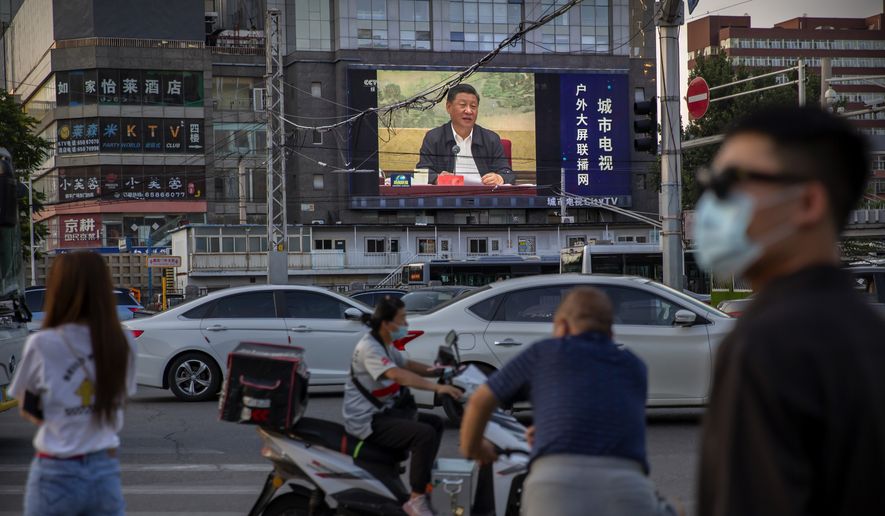The Trump administration said it was now blocking transfers of sensitive U.S. technology to Hong Kong after China on Tuesday formally put in place a harsh new national security law on the former British territory.
Chinese officials said they acted because of local Beijing-backed officials had failed to quell growing unrest and pro-democracy protests in Hong Kong, even as the move brought swift condemnation from the U.S., Europe and Taiwan.
“We hope the law will serve as a deterrent to prevent people from stirring up trouble,” said Tam Yiu-chung, Hong Kong’s sole representative on the government’s Standing Committee “Don’t let Hong Kong be used as a tool to split the country.”
But President Trump vowed to punish Beijing for the crackdown and Tuesday’s high-tech curbs is expected to be just the first of a series of measures.
U.S. Commerce Secretary Wilbur L. Ross Jr. said the new Chinese law increases the risk that cutting-edge American technology sold to the semi-autonomous enclave will be diverted to the People’s Liberation Army and the Ministry of State Security, China’s intelligence and security service.
“Those are risks the U.S. refuses to accept and have resulted in the revocation of Hong Kong’s special status,” Mr. Ross said in a statement.
In the wake of a crackdown on pro-democracy protests. Secretary of State Mike Pompeo announced May 27 that the U.S. government could no longer certify that Hong Kong warranted special treatment that applied when the city enjoyed a much greater degree of autonomy from Chinese oversight.
However, the administration had delayed completely ending the special trade status in a bid to pressure Beijing hold off on the new national security law.
That ended Tuesday when Chinese President Xi Jinping signed the law, allowing Beijing for the first time to establish a security force inside Hong Kong itself to police dissent and anti-government movements.
“This law will be a sharp sword hanging over a minority of people who endanger national security,” said the mainland’s Hong Kong and Macau Affairs Office, which is part of the State Council.
“But for most of the Hong Kong residents, as well as foreigners in the city, this law will be the guardian angel that safeguards their rights, freedom and peaceful way of living.”
China’s National People’s Congress passed the law on Tuesday containing 66 articles. Under the new law, protesters arrested by authorities could face up to life in prison for violations. The state-run Xinhua news service reported that the new law criminalizes acts of secession, subversion, terrorism, collusion with foreign and external sources — all terms defined by the mainland’s authoritarian Communist system.
Critics and Hong Kong activists say the law also undermines the “Basic Law” that guaranteed the city could keep its relatively free legal and political system for 50 years as part of Britain’s agreement to turn Hong Kong back over to China in 1997.
The law is a severe blow to pro-democracy advocates in Hong Kong who have taken to the streets by the thousands to protest China’s increasing grip on local government.
More than a hundred protesters gathered at a luxury mall in Hong Kong’s Central business district, chanting slogans including “Free Hong Kong, Revolution Now,” The Associated Press reported. But some well-known Hong Kong activists said they were stepping back from the protests to gauge the impact of Beijing’s move.
The law’s passage “represents the greatest threat to human rights in the city’s recent history,” said Joshua Rosenzweig, head of Amnesty International’s China Team, while British Foreign Secretary Dominic Raab said London was “deeply concerned” over the “grave step” the law threatens.
Former State Department official John J. Tkacik, a China expert, said the administration resisted taking action to end Hong Kong’s special status. But under the new law, “there is simply no way to consider Hong Kong’s citizens as solely under its independent judiciary,” he said.
The high-tech curb, he said was a necessary precaution, given Hong Kong’s changed status.
“It was an open secret that the existing laws from 1992 permitted the People’s Liberation Army to procure massive amounts of sensitive American technology through Hong Kong middlemen as Hong Kong customs were forced by China to turn a blind eye, especially since 2005,” Mr. Tkacik said.
Mr. Tkacik said the new law will prevent Hong Kong buyers from resisting China’s demands in matters of technology transfers or other activities of state security, financial, banking, civil documents, contracts, shipping, aviation, counterterror and espionage.
As a result, “the United States is no longer in a position to treat Hong Kong as independent from China for the purposes of trade, finance, transportation and communication,” he said.
• Bill Gertz can be reached at bgertz@washingtontimes.com.




Please read our comment policy before commenting.